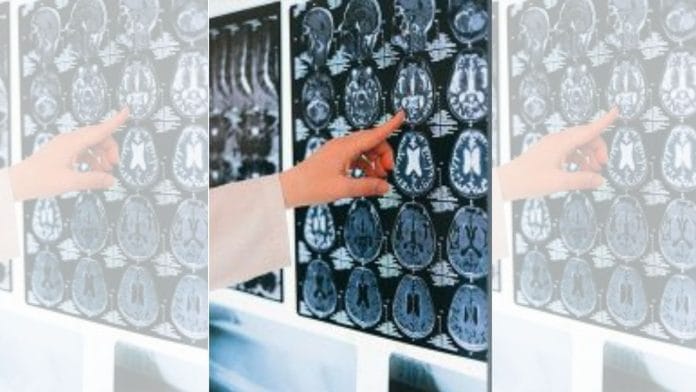New Delhi: The findings from a ground-breaking scientific project on early detection, prevention and treatment of Alzheimer’s disease may lead to a foundational piece of the puzzle.
Scientists associated with the Harvard Medical School in the US say, the key to Alzheimer’s—an incurable neurodegenerative condition—could be lithium metal, already well-known in psychiatry for treating conditions such as bipolar disorder. But until now, its deficiency had not been directly linked with Alzheimer’s.
The disease, which typically affects a large number of those above 65 years of age and is the commonest cause of dementia, is characterised by destruction of memory and mental functions and researchers have been working for decades to find its cure, without success.
The latest study, published in journal Nature this month, showed—for the first time—that lithium naturally occurs in the brain, protects it from neurodegeneration and maintains the normal function of all crucial brain cell types.
The results—which were a decade in the making—are based on a series of meticulously planned experiments on mice and analyses of human brain tissue, apart from blood samples from people in various stages of cognitive health.
“These observations indicate a physiological role for endogenous lithium that affects brain aging and vulnerability to Alzheimer’s,” the scientists noted.
It was estimated that in 2021, nearly 50-400 million people worldwide had Alzheimer’s, typically associated with high levels of beta-amyloids, a specific type of protein whose build-up can seriously impair functioning of several organs such as the brain.
Through this latest project, US scientists found that lithium loss in the human brain is one of the earliest changes leading to Alzheimer’s, while in mice, similar lithium depletion accelerated brain pathology and memory decline.
Also, the reduced lithium levels stemmed from binding to amyloid plaques and impaired uptake in the brain. A final set of experiments also found that a novel lithium compound that avoids capture by amyloid plaques restored memory in mice.
Understandably, clinicians are excited. “This work shifts lithium from the sidelines to centrestage in Alzheimer’s research, revealing it might have an overlooked but important key to understanding the ailment, with implications for its early detection, prevention, and management,” Dr Sudhir Kumar, a senior neurologist associated with Apollo Hospitals in Hyderabad, told ThePrint.
In India, it is estimated that nearly 8 million people are currently living with Alzheimer’s, and this number is projected to double by 2030.
Also read: ‘Rare’ genetic mutation linked to Alzhiemer’s resistance in international study
Spotting the missing link
Experts say that the life-altering disease has for long been associated with clumps of the protein amyloid beta, neurofibrillary tangles of the protein Tau—another crucial protein found in neurons—and loss of a protective type of protein, known as REST.
Yet, these never fully explained the exact cause behind the disease. For instance, some people with these abnormalities have the condition but many others don’t.
For years, research has focused on preventing or slowing beta-amyloid build-up, from early vaccine attempts to more recent monoclonal antibody therapies such as lecanenab and donanenab approved by the US Food And Drug Administration, said Dr Arabinda Mukherjee, neurologist with CMRI Hospital in Kolkata.
These newer drugs typically target the beta-amyloid plaque but don’t reverse memory loss and only modestly reduce the rate of decline.
The risk of the disease has also been linked with genetic and environmental factors but neuroscientists have not been able to figure out why some people with these risk factors develop Alzheimer’s but others don’t.
In this context, the answer thrown by the new study—lithium—could be the critical missing link.
The CMRI neurologist said that anything that gives us a new path towards prevention or slowing progression could have a profound impact—not only on patients, but also on their families and the healthcare system.
“This study is a reminder that sometimes solutions may lie in unexpected places, and that even familiar compounds can reveal new possibilities when science takes a closer look,” he underlined.
Why a potential game-changer
The new findings, experts say, fill a major gap in our understanding of early Alzheimer’s pathology and the study is the first to show that lithium is naturally present in the brain and that its levels drop significantly in individuals with mild cognitive impairment (MCI), a precursor to Alzheimer’s.
Among the implications of the results, said Dr Kumar, could be the reframing of lithium from a psychiatric drug to a potential nutrient-like neuroprotective agent; as the findings have demonstrated, it plays a physiological role in brain health, not just a pharmacologic one, and its deprivation may be an early driver of Alzheimer’s.
It may also lead to introduction of amyloid-evading lithium compounds such as lithium orotate, as unlike conventional lithium salts like carbonates, lithium orotate can bypass amyloid sequestration.
In mouse models, it rescued memory and halted neuropathology without the toxicity seen at higher doses.
Additionally, the work has offered new diagnostic and therapeutic avenues and shown that tracking lithium levels, possibly through blood or imaging, could serve as an early biomarker for disease risk.
Low-dose lithium supplementation, especially with plaque-evading forms, may emerge as a preventative or disease-modifying strategy, pointed out Dr Kumar.
(Edited by Viny Mishra)
Also read: There is a huge treatment gap for neurological conditions like Alzheimer’s—how to close it






